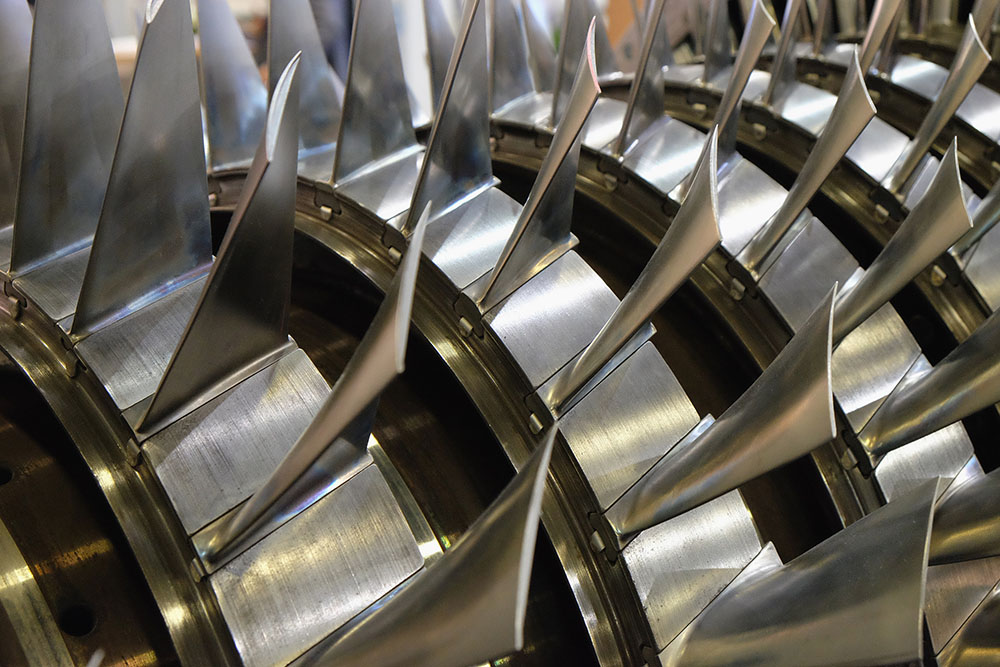Extreme-scale simulations of Roughness Effects on Compressor and Turbine Performance and Heat Transfer
Gas turbines (GTs) play an important role in power generation and transport. They produce a lot of power per unit volume or mass and, depending on configuration, can be very efficient and responsive. GTs can also run on conventional or zero emission fuels such as hydrogen. GTs therefore have an important role to play in supporting renewable-rich, decarbonised power systems, whilst also being the dominant form of propulsion for commercial aircraft for the foreseeable future.

The performance of gas turbines can be affected when blade surfaces become rough due to fouling or erosion, with efficiency of components dropping up to 10%. Given that 20% of total electricity in Australia was produced by gas turbines in 2015, and Australian commercial aviation burned 8.4 billion litres of fuel in 2019, roughness effects have a tremendous impact on cost and emissions. Therefore, any engine performance improvements realised through better understanding and prediction of roughness effects can save billions of dollars and help significantly reduce CO2 emissions. Additionally, better prediction of how roughness, developing during GT operation, affects performance and heat transfer can substantially increase operability, durability and life of GTs. Understanding and predicting roughness effects in GT flows is particularly challenging, because the roughness topologies are intricate and cannot be easily characterised, and the flow fields in GTs are turbulent and complex.
A team at the University of Melbourne, led by MEI Power Generation and Transport Program Leader Professor Richard Sandberg, have made significant progress using very sophisticated experimental campaigns, and recently, computer simulations. The Fluid Dynamics group lead by Prof Ivan Marusic has been developing a significant understanding of the effect of rough surfaces on turbulent flows and drag for low-speed applications, like ship hulls. “At the same time, with a state-of-the-art in-house flow simulation code, we have performed some of the first highly detailed simulations to understand the complex turbulent flow fields developing on the highly curved surfaces at the extreme conditions that exist in gas turbines, although assuming all surfaces are smooth”, said Professor Sandberg.
This project is a collaboration between the University of Melbourne and General Electric Aviation, and the team has recently been awarded a very substantial amount of computing time through the INCITE program, a program that promotes transformational advances in science and technology through allocations of time on state-of-the-art supercomputers. This will allow them to perform high-fidelity simulations of realistic roughness effects in the context of GT flows at engine-relevant conditions. The data generated will shed light on the fundamental physical mechanisms associated with the effects of blade surface roughness in an environment where experimental observation is effectively impossible.
In addition to generating new understanding that is transferable to other devices, the data will also help evaluate and develop lower order models that can be used in industry for improving the design of GTs and other applications. The outcomes of this project are expected to identify opportunities to increase GT efficiency by 2-4% and extend their durability.
“Further improving gas turbine efficiency, durability and cost of ownership is important due to the scale of their use. Building prototypes is expensive and time consuming, and it is very, very difficult to measure the details of the airflow inside due to the very high temperatures, pressures and rotating speeds”, said Professor Sandberg. “Running high-fidelity simulations on the largest supercomputers can tell engineers exactly what is happening to the airflow in an engine and how tweaks to designs can affect performance”.
To find out more about this project, please contact Professor Richard Sandberg.